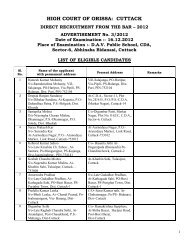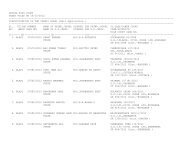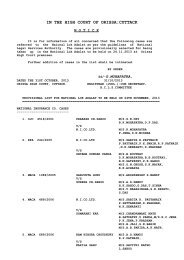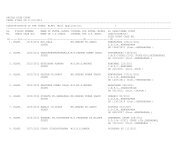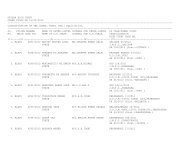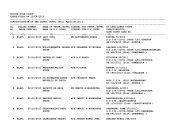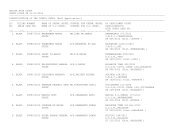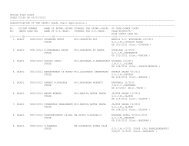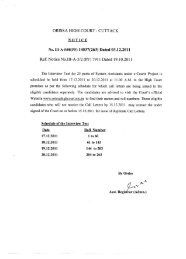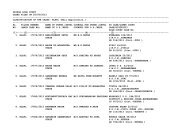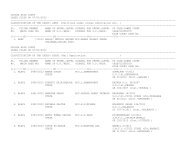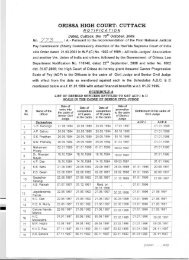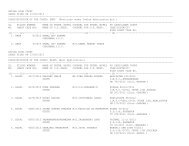ORIGINAL JURISDICTION - Orissa High Court
ORIGINAL JURISDICTION - Orissa High Court
ORIGINAL JURISDICTION - Orissa High Court
Create successful ePaper yourself
Turn your PDF publications into a flip-book with our unique Google optimized e-Paper software.
150<br />
not get the damages. To meet such a situation, various<br />
legislations were enacted in England. For the first time, Third Parties<br />
(Rights Against Insurers) Act, 1930 was enacted, the provisions of<br />
which find place in Section 97 of the Act which gave to third party<br />
right to sue directly against the insurer. Subsequently, the Road<br />
Traffic Act, 1930 was enacted which provided for compulsory<br />
insurance of motor vehicles. The provisions of the said Act was<br />
engrafted in Section 95 of the Act. Under Section 38 of English Act,<br />
1930, certain conditions of insurance policy were made ineffective so<br />
far as the third parties were concerned. The object behind the<br />
aforesaid legislations was that third party right should not suffer on<br />
account of failure of comply with those terms of the insurance policy.<br />
Section 94 of the Act gives protection to third party in respect of<br />
death or bodily injury or damage to the property while using the<br />
vehicle in public place and, therefore, the insurance of vehicle had<br />
been made compulsory under Section 94 read with Section 95 of the<br />
Act.<br />
SMT. TULASI SAHUKAR -V- NEW INDIA ASSURANCE [B.K.PATEL,J.]<br />
4. A perusal of Sections 94 and 95 would further show that the said<br />
provisions do not make compulsory insurance to the vehicle or to the<br />
owners. Thus, it is manifest that compulsory insurance is for the<br />
benefit of third parties. The scheme of the Act shows that an<br />
insurance policy can cover three kinds of risks, i.e., owner of the<br />
vehicle; property (vehicle) and third party. The liability of the owner<br />
to have compulsory insurance is only in regard to the third party and<br />
not to the property. Section 95 (5) of the Act runs as follows:<br />
“Notwithstanding anything elsewhere contained in any law, a<br />
person issuing a policy of insurance under this section shall be liable<br />
to indemnify the person or classes of persons specified in the policy<br />
in respect of any liability which the policy purports to cover in the<br />
case of that person or those classes of persons.”<br />
5. The aforesaid provision shows that it was intended to cover two<br />
legal objectives. Firstly, that no one who was not a party to a<br />
contract would bring an action on a contract ; and secondly, that a<br />
person who has no interest in the subject matter of an insurance can<br />
claim the benefit of an insurance. Thus, once the vehicle is insured,<br />
the owner as well as any other person can use the vehicle with the<br />
consent of the owner. Section 94 does not provide that any person<br />
who will use the vehicle shall insure the vehicle in respect of his<br />
separate use.



